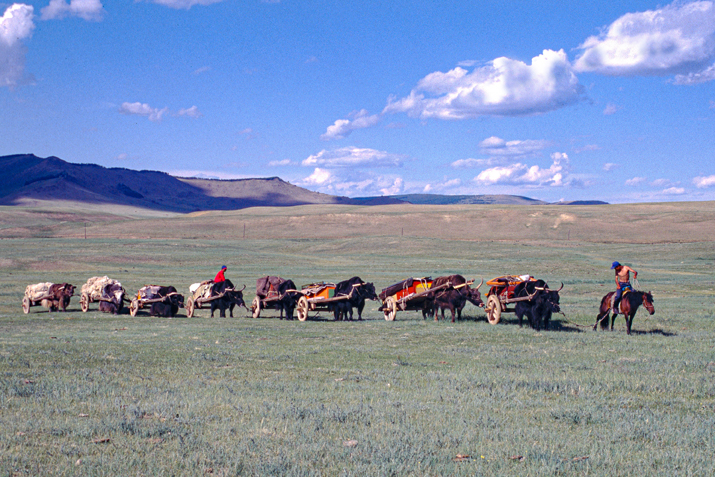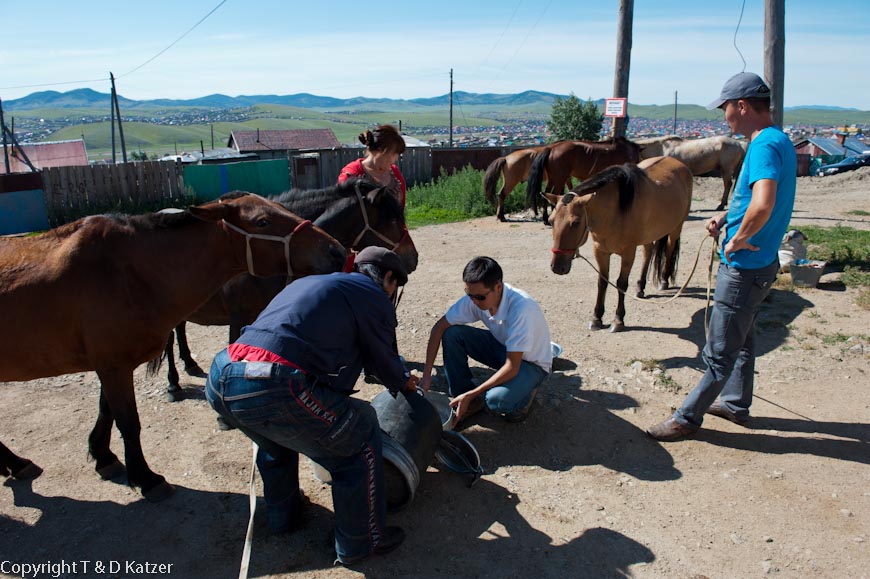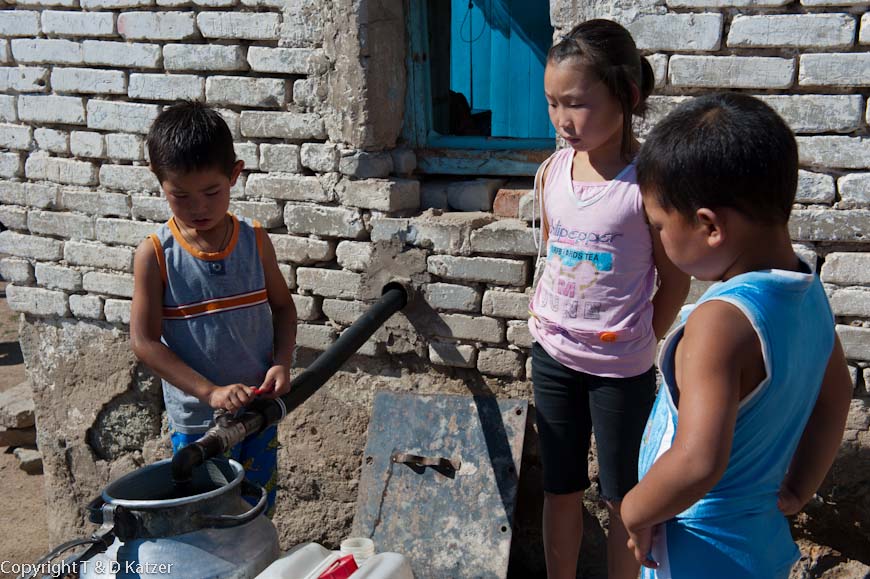
Departure
N 48°58'100'' E 103°55'064''
Day: 25
Sunrise:
06:00 a.m.
Sunset:
8:16 pm
As the crow flies:
12
Daily kilometers:
17
Total kilometers:
417
Soil condition:
Meadow
Temperature – Day (maximum):
35 °C
Temperature – day (minimum):
29 °C
Temperature – Night:
12 °C
Latitude:
48°58’100”
Longitude:
103°55’064”
Maximum height:
1415 m above sea level


In the morning we drag all our equipment onto the veranda of the log cabin while Bilgee and Naraa lead the horses into the neighboring garden to feed. There they can really get stuck in before setting off because the grass is a meter high. Ulzii went to the market again to get another felt mat and hooks for the horse-drawn cart. Then we adjust the saddles. Bilgee once again proves to be very experienced. With a connoisseur’s eye, he cuts and binds the herding ropes, knots the halters or fixes the bridle. Then we load the horse-drawn cart for the first time and, thank God, we get everything underneath. When Bilgee and Ulzii want to harness the bright and strong cart horse, it gets big eyes and refuses to go under the drawbar for the time being. It is only thanks to Bilgee’s experience that the chariot horse bends. “Nevertheless, it stands nervously in front of the cart. When the two of them try to take it for a first walk, it looks as if the light-colored carriage horse is going to bolt. Bilgee decides to call the carters and ask for advice. Another wise decision, as a young hothead might have taken a chance on an attempt that could end badly. Half an hour later, the carters actually turn up. They test the horse-drawn cart and find my construction a success. Then they hitch Sharga up again. Sharga is the Mongolian word for yellow. Because of his beige coat color, we call him yellow from now on, Sharga. “You are not allowed to lead and pull Sharga, but one of you must sit on the cart and steer him with the reins. That’s what he’s used to. Anything else is too dangerous,” the carters decide. “We can’t burden Sharga with the weight of a human being on top of all the equipment. That’s far too much,” I say. “Ha,ha,ha,! Too much? That’s not too much. Sharga is used to transporting logs. He has to pull a lot more. Your horse-drawn cart is definitely not too heavy,” say the carters. Then they grab Sharga, lead him out of Naraa’s yard in the horse-drawn cart and one of them sits on the drawbar and rides off. Before we know it, the carters have disappeared. “Are they doing a test now or have they already started?” I ask, amazed at the speed of the departure. “I don’t think they’ll come back,” says Tanja, which is why we get into our saddles and ride our horses for the first time, equipped with saddlebags, bridles, halters and hobbles. Because of the rush, we leave Naraa’s log cabin behind without turning around. On the gravel road we overtake Naraa, who has also hurried ahead and is leading the second cart horse. As it is dark brown and the color brown is called boron in Mongolia, we call it boron from now on.
Ulzii rides on his horse which he calls Od (translated star) and leads Bilgee’s riding horse called Tenger (translated heaven) on a halter line behind him. Still a little unsteady in the saddle, we reach the main road. Suddenly my saddle slips. I dismount and almost fall off my horse. Because the tips of the ears are white, I actually wanted to call it a white tip. But since we have given all the horses Mongolian names, I don’t want to make an exception and call it Sar, which translates as moon. “Can he even ride?” a woman calls out of the car window, making fun of me. “He can ride very well!” Ulzii defends me, calling after the woman. “It’s quite a risk not to have ridden for 15 years and suddenly I’m going out into the wilderness on horseback for a long time,” I think to myself, tightening the girths as tightly as I can and getting back into the saddle. Things feel better now. We follow Bilgee, who is now dangling his left leg downwards, sitting at an angle on one of the two thin trunks that extend forward from the wagon. Sharga is sandwiched in between. I now call the tree trunks drawbars. Mogi is tied to the horse-drawn cart with a string and is pulled behind against his will. Cars overtake us and many eyes watch the strange-looking train. On the outskirts of the town, Naraa hands over the second chariot horse to Ulzii, who now leads two horses. “Goodbye and have a good and safe journey!” she calls after us. “Thank you very much for your hospitality and kind hospitality!” we reply. We throw a few more kisses back and forth and wave until Naraa disappears from view.
We follow narrow, dusty alleyways. To the left and right are the small log houses with the colorful roofs. Each of them has an almost equally large garden or courtyard of around 800 square meters. The estates are bordered by ugly wooden fences. Dogs bark and yap behind the boards. Many of them have found holes to get onto the road, or whatever you call the muddy, holey path here. When they discover our wagon train, it is suddenly declared prey. Packs of three, four or more dogs attack us barking. They are particularly after Mogi, who is hanging defencelessly from the rope and is now trotting behind the wagon. We turn our horses around and launch a counterattack. The pack of dogs is impressed and runs off. And so we continue to the last watering place in Erdenet, which we use to give our horses another good drink. Mogi uses one of the mud holes to cool off. He doesn’t care about the dirt in this hole. From this point on, he will carry the crumbs of clay stuck to his fur around with him for days.
We leave Erdenet behind us and instantly find ourselves in a dreamland. Herds of yaks, sheep, goats and horses are our constant companions. We ride over gently rolling hills. The lovely late afternoon sun creates long shadows. A few large storm clouds creep over the grassy hills and bring shade from time to time. Bilgee is still sitting quite uncomfortably on the left side of the drawbar. But he doesn’t lose a single note of complaint. “That’s my home over the hills,” he says kindly. That’s actually our goal for today. But as we didn’t set off until 16:00, we won’t be able to reach it. At 19:30 Bilgee suggests we set up camp. “A good choice,” I say, because the camp site is on a meadow that stretches from here to the horizon. We unsaddle the horses and because of the good weather we decide not to put up the tents. Bilgee and Ulzii lay their sleeping mats, which we gave them, on one of the felt blankets I bought. We, on the other hand, roll out our sleeping mats on a tarpaulin. While our companions hitch up the horses and hitch them up in pairs for the night, I am busy with the horse-drawn cart and setting up camp for the night, Tanja prepares a hearty noodle soup on the small stove. After the enormous amount of preparation, the endless effort to obtain visas and the often tiresome negotiations with the vendors, nomads and craftsmen, we are happy to enjoy the almost indescribable peace and quiet of the highland steppe. We are all happy about the positive start to the expedition and that Tanja and I have made it through the first 17 kilometers on horseback. “I can already feel my bottom,” says Tanja. “We’ll have sore muscles tomorrow,” I reply contentedly, hungrily slurping my soup. For dessert, each of us gets a Russian sweet that tastes like Jell-O after such a short time out here. Then we drink tea and enjoy some boortsog bought in the supermarket. I then crawl into my sleeping bag on a full stomach. Despite the exertions of the day, we have to keep watch at night to protect our horses from possible thieves. Tanja has the first shift from 10:00 to 24:00. I’m on from 24:00 to 2:00. Then come Bilgee and Ulzii.
I have barely closed my eyes when I hear Tanja’s wake-up call. “Denis! Get up. Your shift is starting.” “Tired, I struggle out of my sleeping bag. Equipped with a headlamp, I walk our horses to see if everything is okay with the ropes. Then I sit down on my camp chair and use the time to do some personal hygiene. For the remaining half hour, I gaze up at the clear starry sky and feel the deep contentment that I can only feel out here in the wilderness. At 2:00 a.m. I wake Bilgee, who gets up without grumbling and takes over from me. Shivering, I crawl into my sleeping bag and wait for tiredness to carry me off into the land of dreams.
We look forward to your comments!

